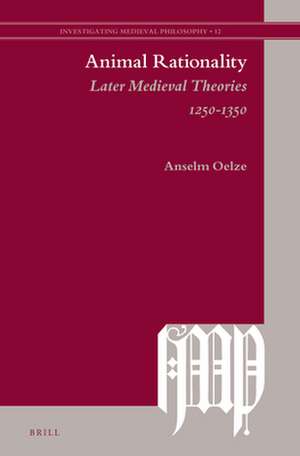Animal Rationality: Later Medieval Theories 1250-1350: Investigating Medieval Philosophy, cartea 12
Autor Anselm Oelzeen Limba Engleză Hardback – 21 mar 2018
Din seria Investigating Medieval Philosophy
- 18%
 Preț: 794.14 lei
Preț: 794.14 lei - 23%
 Preț: 961.81 lei
Preț: 961.81 lei - 18%
 Preț: 730.87 lei
Preț: 730.87 lei - 18%
 Preț: 840.93 lei
Preț: 840.93 lei - 18%
 Preț: 762.88 lei
Preț: 762.88 lei - 18%
 Preț: 672.33 lei
Preț: 672.33 lei - 18%
 Preț: 764.05 lei
Preț: 764.05 lei - 18%
 Preț: 699.42 lei
Preț: 699.42 lei - 18%
 Preț: 625.25 lei
Preț: 625.25 lei - 18%
 Preț: 812.55 lei
Preț: 812.55 lei - 18%
 Preț: 939.68 lei
Preț: 939.68 lei - 18%
 Preț: 1037.81 lei
Preț: 1037.81 lei - 18%
 Preț: 716.04 lei
Preț: 716.04 lei - 18%
 Preț: 610.67 lei
Preț: 610.67 lei - 18%
 Preț: 780.71 lei
Preț: 780.71 lei
Preț: 725.54 lei
Preț vechi: 884.80 lei
-18% Nou
Puncte Express: 1088
Preț estimativ în valută:
138.85€ • 144.43$ • 114.63£
138.85€ • 144.43$ • 114.63£
Carte indisponibilă temporar
Doresc să fiu notificat când acest titlu va fi disponibil:
Se trimite...
Preluare comenzi: 021 569.72.76
Specificații
ISBN-13: 9789004363625
ISBN-10: 9004363629
Pagini: 270
Dimensiuni: 155 x 235 x 23 mm
Greutate: 0.54 kg
Editura: Brill
Colecția Brill
Seria Investigating Medieval Philosophy
ISBN-10: 9004363629
Pagini: 270
Dimensiuni: 155 x 235 x 23 mm
Greutate: 0.54 kg
Editura: Brill
Colecția Brill
Seria Investigating Medieval Philosophy
Cuprins
Preface
Introduction
1 What are and Why Study Later Medieval Theories of Animal Rationality?
2 How to Study Later Medieval Theories?
3 Structure and Key Questions
Introduction to Part 1
4 The Role of Animals in the Middle Ages
5 Animal Souls and Sensory Cognition
6 Human Souls and the Triad of Intellectual Operations
7 Grey Areas
Introduction to Part 2
8 Estimation, Conceptualisation, and Categorisation (Thomas Aquinas)
9 Intentions and Quiddities (Albertus Magnus)
10 Elevated Intentions and Common Forms (Pseudo-Peter of Spain)
11 Vague Particulars as Universals (Roger Bacon)
12 Universal Desire and Experience (John Buridan)
13 General Mental Representations (Peter of John Olivi)
Introduction to Part 3
14 The Idea of Sensory Judgments
15 Natural Judgments (Thomas Aquinas)
16 Erroneous Judgments and Differences in Estimation (Albertus Magnus)
17 Reflective and Experimental Judgments (Peter of John Olivi, John Buridan)
18 The Ascription of Judgments and the Problem of Anthropomorphism (William of Ockham, Adam Wodeham, Gregory of Rimini)
Introduction to Part 4
19 Quasi-Reasoning (Thomas Aquinas, Gregory of Rimini, John Duns Scotus)
20 Quasi-Reasoning and Cogitation (Roger Bacon)
21 Imperfect Argumentations and Practical Syllogisms (Albertus Magnus)
22 Material Souls and Degrees of Reasoning (John Buridan, Nicole Oresme)
Introduction to Part 5
23 Memory vs. Recollection (Albertus Magnus)
24 Incomplete and Complete Memory (Thomas Aquinas, Roger Bacon)
25 Foresight and Provision (Albertus Magnus, Bonaventure)
26 Quasi-Foresight and Quasi-Hope (Thomas Aquinas)
27 Operating for and towards the Future (Roger Bacon, Peter of John Olivi)
28 Imperfect or Particular Prudence (Albertus Magnus, Thomas Aquinas)
29 Prudence by Analogy (Giles of Rome, John Duns Scotus)
Introduction to Part 6
30 Medieval and Contemporary Theories: The Differences
31 Medieval and Contemporary Theories: The Commonalities
32 Towards a Classification: Differentialist and Assimilationist Explanations
33 Room for Rationality or Rationality without Reason
Conclusion
Bibliography
Index of Names
Index of Subjects
Introduction
1 What are and Why Study Later Medieval Theories of Animal Rationality?
2 How to Study Later Medieval Theories?
3 Structure and Key Questions
Part 1: Animals and Rationality in the Middle Ages
Introduction to Part 1
4 The Role of Animals in the Middle Ages
5 Animal Souls and Sensory Cognition
6 Human Souls and the Triad of Intellectual Operations
7 Grey Areas
Part 2: Universal Cognition and Concept Formation
Introduction to Part 2
8 Estimation, Conceptualisation, and Categorisation (Thomas Aquinas)
9 Intentions and Quiddities (Albertus Magnus)
10 Elevated Intentions and Common Forms (Pseudo-Peter of Spain)
11 Vague Particulars as Universals (Roger Bacon)
12 Universal Desire and Experience (John Buridan)
13 General Mental Representations (Peter of John Olivi)
Part 3: Judging
Introduction to Part 3
14 The Idea of Sensory Judgments
15 Natural Judgments (Thomas Aquinas)
16 Erroneous Judgments and Differences in Estimation (Albertus Magnus)
17 Reflective and Experimental Judgments (Peter of John Olivi, John Buridan)
18 The Ascription of Judgments and the Problem of Anthropomorphism (William of Ockham, Adam Wodeham, Gregory of Rimini)
Part 4: Reasoning
Introduction to Part 4
19 Quasi-Reasoning (Thomas Aquinas, Gregory of Rimini, John Duns Scotus)
20 Quasi-Reasoning and Cogitation (Roger Bacon)
21 Imperfect Argumentations and Practical Syllogisms (Albertus Magnus)
22 Material Souls and Degrees of Reasoning (John Buridan, Nicole Oresme)
Part 5: Prudence
Introduction to Part 5
23 Memory vs. Recollection (Albertus Magnus)
24 Incomplete and Complete Memory (Thomas Aquinas, Roger Bacon)
25 Foresight and Provision (Albertus Magnus, Bonaventure)
26 Quasi-Foresight and Quasi-Hope (Thomas Aquinas)
27 Operating for and towards the Future (Roger Bacon, Peter of John Olivi)
28 Imperfect or Particular Prudence (Albertus Magnus, Thomas Aquinas)
29 Prudence by Analogy (Giles of Rome, John Duns Scotus)
Part 6: Rationality without Reason?
Introduction to Part 6
30 Medieval and Contemporary Theories: The Differences
31 Medieval and Contemporary Theories: The Commonalities
32 Towards a Classification: Differentialist and Assimilationist Explanations
33 Room for Rationality or Rationality without Reason
Conclusion
Bibliography
Index of Names
Index of Subjects
Notă biografică
Anselm Oelze obtained a PhD in philosophy from the Humboldt University of Berlin (2017) and worked as a postdoctoral researcher at the University of Helsinki. He has published articles on animal cognition and animal ethics in the Middle Ages.
Recenzii
"Cette approche, à la fois historique et systématique, de la rationalité animale aboutit à une étude passionnante, dont le propos, agrémenté de nombreux exemples, allie la clarté à l’élégance. Nul doute que cette étude maîtrisée d’un corpus et d’un réseau de questions originaux constitue une contribution majeure à l’histoire de la philosophie médiévale". Véronique Decaix, Bulletin de Philosophie Medievale, 21 (3), (2020).
